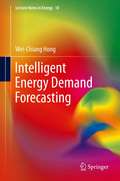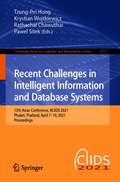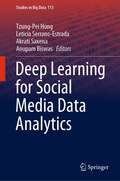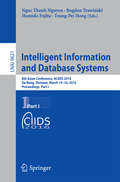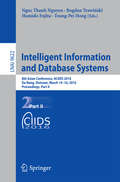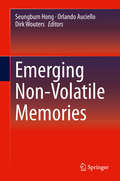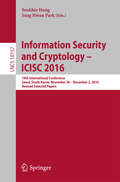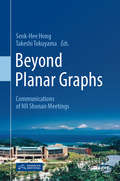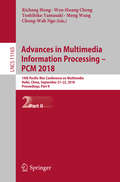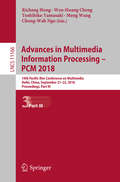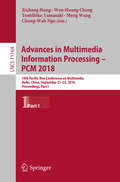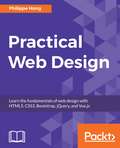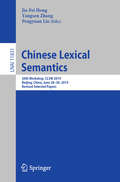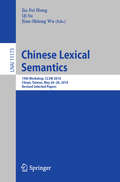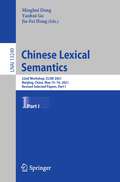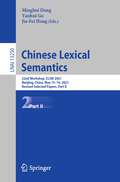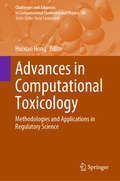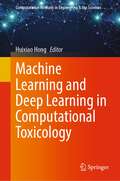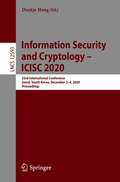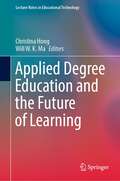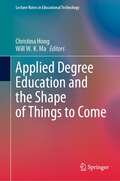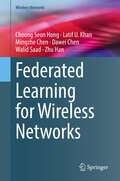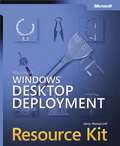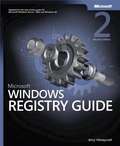- Table View
- List View
Intelligent Energy Demand Forecasting
by Wei-Chiang HongAs industrial, commercial, and residential demands increase and with the rise of privatization and deregulation of the electric energy industry around the world, it is necessary to improve the performance of electric operational management. Intelligent Energy Demand Forecasting offers approaches and methods to calculate optimal electric energy allocation to reach equilibrium of the supply and demand. Evolutionary algorithms and intelligent analytical tools to improve energy demand forecasting accuracy are explored and explained in relation to existing methods. To provide clearer picture of how these hybridized evolutionary algorithms and intelligent analytical tools are processed, Intelligent Energy Demand Forecasting emphasizes on improving the drawbacks of existing algorithms. Written for researchers, postgraduates, and lecturers, Intelligent Energy Demand Forecasting helps to develop the skills and methods to provide more accurate energy demand forecasting by employing novel hybridized evolutionary algorithms and intelligent analytical tools.
Recent Challenges in Intelligent Information and Database Systems: 13th Asian Conference, ACIIDS 2021, Phuket, Thailand, April 7–10, 2021, Proceedings (Communications in Computer and Information Science #1371)
by Tzung-Pei Hong Krystian Wojtkiewicz Rathachai Chawuthai Pawel SitekThis volume constitutes the refereed proceedings of the 13th Asian Conference on Intelligent Information and Database Systems, ACIIDS 2021, held in Phuket, Thailand, in April 2021. The total of 35 full papers accepted for publication in these proceedings were carefully reviewed and selected from 291 submissions. The papers are organized in the following topical sections: data mining and machine learning methods; advanced data mining techniques and applications; intelligent and contextual systems; natural language processing; network systems and applications; computational imaging and vision; decision support and control systems; data modelling and processing for Industry 4.0.
Deep Learning for Social Media Data Analytics (Studies in Big Data #113)
by Tzung-Pei Hong Leticia Serrano-Estrada Akrati Saxena Anupam BiswasThis edited book covers ongoing research in both theory and practical applications of using deep learning for social media data. Social networking platforms are overwhelmed by different contents, and their huge amounts of data have enormous potential to influence business, politics, security, planning and other social aspects. Recently, deep learning techniques have had many successful applications in the AI field. The research presented in this book emerges from the conviction that there is still much progress to be made toward exploiting deep learning in the context of social media data analytics. It includes fifteen chapters, organized into four sections that report on original research in network structure analysis, social media text analysis, user behaviour analysis and social media security analysis. This work could serve as a good reference for researchers, as well as a compilation of innovative ideas and solutions for practitioners interested in applying deep learning techniques to social media data analytics.
Intelligent Information and Database Systems
by Tzung-Pei Hong Hamido Fujita Bogdan Trawiński Ngoc Thanh NguyenIntelligent information and database systems are two closely related and we- established subfields of modern computer science. They focus on the integration of artificial intelligence and classic database technologies in order to create the class of next generation information systems. The major target of this new gene- tion of systems is to provide end-users with intelligent behavior: simple and/or advanced learning, problem solving, uncertain and certain reasoning, se- organization, cooperation, etc. Such intelligent abilities are implemented in classic information systems to make them autonomous and user oriented, in particular when advanced problems of multimedia information and knowledge discovery, access, retrieval and manipulation are to be solved in the context of large, distr- uted and heterogeneous environments. It means that intelligent knowledge-based information and database systems are used to solve basic problems of large coll- tions management, carry out knowledge discovery from large data collections, reason about information under uncertain conditions, support users in their for- lation of complex queries etc. Topics discussed in this volume include but are not limited to the foundations and principles of data, information, and knowledge models, methodologies for intelligent information and database systems analysis, design, implementation, validation, maintenance and evolution.
Intelligent Information and Database Systems
by Tzung-Pei Hong Hamido Fujita Bogdan Trawiński Ngoc Thanh NguyenIntelligent information and database systems are two closely related and we- established subfields of modern computer science. They focus on the integration of artificial intelligence and classic database technologies in order to create the class of next generation information systems. The major target of this new gene- tion of systems is to provide end-users with intelligent behavior: simple and/or advanced learning, problem solving, uncertain and certain reasoning, se- organization, cooperation, etc. Such intelligent abilities are implemented in classic information systems to make them autonomous and user oriented, in particular when advanced problems of multimedia information and knowledge discovery, access, retrieval and manipulation are to be solved in the context of large, distr- uted and heterogeneous environments. It means that intelligent knowledge-based information and database systems are used to solve basic problems of large coll- tions management, carry out knowledge discovery from large data collections, reason about information under uncertain conditions, support users in their for- lation of complex queries etc. Topics discussed in this volume include but are not limited to the foundations and principles of data, information, and knowledge models, methodologies for intelligent information and database systems analysis, design, implementation, validation, maintenance and evolution.
Emerging Non-Volatile Memories
by Seungbum Hong Orlando Auciello Dirk WoutersThis book is an introduction to the fundamentals of emerging non-volatile memories and provides an overview of future trends in the field. Readers will find coverage of seven important memory technologies, including Ferroelectric Random Access Memory (FeRAM), Ferromagnetic RAM (FMRAM), Multiferroic RAM (MFRAM), Phase-Change Memories (PCM), Oxide-based Resistive RAM (RRAM), Probe Storage, and Polymer Memories. Chapters are structured to reflect diffusions and clashes between different topics. Emerging Non-Volatile Memories is an ideal book for graduate students, faculty, and professionals working in the area of non-volatile memory. This book also: Covers key memory technologies, including Ferroelectric Random Access Memory (FeRAM), Ferromagnetic RAM (FMRAM), and Multiferroic RAM (MFRAM), among others. Provides an overview of non-volatile memory fundamentals. Broadens readers' understanding of future trends in non-volatile memories.
Information Security and Cryptology – ICISC 2016
by Seokhie Hong Jong Hwan ParkThis book constitutes revised selected papers from the 19th International Conference on Information Security and Cryptology, ICISC 2016, held in Seoul, South Korea, in November/December 2016. The 18 full papers presented in this volume were carefully reviewed and selected from 69 submissions. There were organized in topical sections named: protocols; lattice cryptography; encryption; implementation and algorithms; signatures and protocol; and analysis.
Beyond Planar Graphs: Communications of NII Shonan Meetings
by Seok-Hee Hong Takeshi TokuyamaThis book is the first general and extensive review on the algorithmics and mathematical results of beyond planar graphs. Most real-world data sets are relational and can be modelled as graphs consisting of vertices and edges. Planar graphs are fundamental for both graph theory and graph algorithms and are extensively studied. Structural properties and fundamental algorithms for planar graphs have been discovered. However, most real-world graphs, such as social networks and biological networks, are non-planar. To analyze and visualize such real-world networks, it is necessary to solve fundamental mathematical and algorithmic research questions on sparse non-planar graphs, called beyond planar graphs.This book is based on the National Institute of Informatics (NII) Shonan Meeting on algorithmics on beyond planar graphs held in Japan in November, 2016. The book consists of 13 chapters that represent recent advances in various areas of beyond planar graph research. The main aims and objectives of this book include 1) to timely provide a state-of-the-art survey and a bibliography on beyond planar graphs; 2) to set the research agenda on beyond planar graphs by identifying fundamental research questions and new research directions; and 3) to foster cross-disciplinary research collaboration between computer science (graph drawing and computational geometry) and mathematics (graph theory and combinatorics). New algorithms for beyond planar graphs will be in high demand by practitioners in various application domains to solve complex visualization problems. This book therefore will be a valuable resource for researchers in graph theory, algorithms, and theoretical computer science, and will stimulate further deep scientific investigations into many areas of beyond planar graphs.
Advances in Multimedia Information Processing – PCM 2018: 19th Pacific-Rim Conference on Multimedia, Hefei, China, September 21-22, 2018, Proceedings, Part II (Lecture Notes in Computer Science #11165)
by Richang Hong Wen-Huang Cheng Toshihiko Yamasaki Meng Wang Chong-Wah NgoThe three-volume set LNCS 101164, 11165, and 11166 constitutes the refereed proceedings of the 19th Pacific-Rim Conference on Multimedia, PCM 2018, held in Hefei, China, in September 2018.The 209 regular papers presented together with 20 special session papers were carefully reviewed and selected from 452 submissions. The papers cover topics such as: multimedia content analysis; multimedia signal processing and communications; and multimedia applications and services.
Advances in Multimedia Information Processing – PCM 2018: 19th Pacific-Rim Conference on Multimedia, Hefei, China, September 21-22, 2018, Proceedings, Part III (Lecture Notes in Computer Science #11166)
by Richang Hong Wen-Huang Cheng Toshihiko Yamasaki Meng Wang Chong-Wah NgoThe three-volume set LNCS 101164, 11165, and 11166 constitutes the refereed proceedings of the 19th Pacific-Rim Conference on Multimedia, PCM 2018, held in Hefei, China, in September 2018.The 209 regular papers presented together with 20 special session papers were carefully reviewed and selected from 452 submissions. The papers cover topics such as: multimedia content analysis; multimedia signal processing and communications; and multimedia applications and services.
Advances in Multimedia Information Processing – PCM 2018: 19th Pacific-Rim Conference on Multimedia, Hefei, China, September 21-22, 2018, Proceedings, Part I (Lecture Notes in Computer Science #11164)
by Richang Hong Wen-Huang Cheng Toshihiko Yamasaki Meng Wang Chong-Wah NgoThe three-volume set LNCS 101164, 11165, and 11166 constitutes the refereed proceedings of the 19th Pacific-Rim Conference on Multimedia, PCM 2018, held in Hefei, China, in September 2018.The 209 regular papers presented together with 20 special session papers were carefully reviewed and selected from 452 submissions. The papers cover topics such as: multimedia content analysis; multimedia signal processing and communications; and multimedia applications and services.
Practical Web Design: Learn the fundamentals of web design with HTML5, CSS3, Bootstrap, jQuery, and Vue.js
by Philippe HongA step by step guide for beginners to create interactive and dynamic websites from scratch.Key FeaturesA fun-filled book with incrementing projects that would help you learn and adapt the fundamentals of web developmentBring your web design to life with the help of HTML, CSS, JQuery, and learn to kick-start your future projects with BootstrapExplore popular web development techniques such as responsive, adaptive, and material design and initiate yourself with Vue.jsBook DescriptionWeb design is the process of creating websites. It encompasses several different aspects, including webpage layout, content production, and graphic design. This book offers you everything you need to know to build your websites. The book starts off by explaining the importance of web design and the basic design components used in website development. It'll show you insider tips to work quickly and efficiently with web technologies such as HTML5, CSS3, and JavaScript, concluding with a project on creating a static site with good layout. Once you've got that locked down, we'll get our hands dirty by diving straight into learning JavaScript and JQuery, ending with a project on creating dynamic content for your website. After getting our basic website up and running with the dynamic functionalities you'll move on to building your own responsive websites using more advanced techniques such as Bootstrap. Later you will learn smart ways to add dynamic content, and modern UI techniques such as Adaptive UI and Material Design. This will help you understand important concepts such as server-side rendering and UI components. Finally we take a look at various developer tools to ease your web development process.What you will learnUnderstand the importance of web design and the basic design componentsLearn HTML5 and CSS3Difference between adaptive and responsive web designLearn how to create your first websiteAdd interaction and dynamic content to your website with JavaScript and JQueryImplement Bootstrap Framework in your project Get familiar with server-side renderingWho this book is forThis book is for anyone who wants to learn about web development regardless of previous experience. It's perfect for complete beginners with zero experience; it's also great for anyone who does have some experience in a few technologies (such as HTML and CSS) but not all of them.
Chinese Lexical Semantics: 20th Workshop, CLSW 2019, Beijing, China, June 28–30, 2019, Revised Selected Papers (Lecture Notes in Computer Science #11831)
by Jia-Fei Hong Yangsen Zhang Pengyuan LiuThis book constitutes the thoroughly refereed post-workshop proceedings of the 20th Chinese Lexical Semantics Workshop, CLSW 2019, held in Chiayi, Taiwan, in June 2019. The 39 full papers and 46 short papers included in this volume were carefully reviewed and selected from 254 submissions. They are organized in the following topical sections: lexical semantics; applications of natural language processing; lexical resources; corpus linguistics.
Chinese Lexical Semantics: 19th Workshop, CLSW 2018, Chiayi, Taiwan, May 26–28, 2018, Revised Selected Papers (Lecture Notes in Computer Science #11173)
by Jia-Fei Hong Qi Su Jiun-Shiung WuThis book constitutes the thoroughly refereed post-workshop proceedings of the 19th Chinese Lexical Semantics Workshop, CLSW 2018, held in Chiayi, Taiwan, in May 2018. The 50 full papers and 19 short papers included in this volume were carefully reviewed and selected from 150 submissions. They are organized in the following topical sections: Lexical Semantics; Applications of Natural Language Processing; Lexical Resources; Corpus Linguistics.
Chinese Lexical Semantics: 22nd Workshop, CLSW 2021, Nanjing, China, May 15–16, 2021, Revised Selected Papers, Part I (Lecture Notes in Computer Science #13249)
by Jia-Fei Hong Minghui Dong Yanhui GuThe two-volume proceedings, LNCS 13249 and 13250, constitutes the thoroughly refereed post-workshop proceedings of the 22nd Chinese Lexical Semantics Workshop, CLSW 2021, held in Nanjing, China in May 2021. The 68 full papers and 4 short papers were carefully reviewed and selected from 261 submissions. They are organized in the following topical sections: Lexical Semantics and General Linguistics; Natural Language Processing and Language Computing; Cognitive Science and Experimental Studies; Lexical Resources and Corpus Linguistics.
Chinese Lexical Semantics: 22nd Workshop, CLSW 2021, Nanjing, China, May 15–16, 2021, Revised Selected Papers, Part II (Lecture Notes in Computer Science #13250)
by Jia-Fei Hong Minghui Dong Yanhui GuThis book constitutes the thoroughly refereed post-workshop proceedings of the 22nd Chinese Lexical Semantics Workshop, CLSW 2021, held in Nanjing, China in May 2021. The 68 full papers and 4 short papers included in this volume were carefully reviewed and selected from 261 submissions. They are organized in the following topical sections: Lexical Semantics and General Linguistics; Natural Language Processing and Language Computing; Cognitive Science and Experimental Studies; Lexical Resources and Corpus Linguistics.
Advances in Computational Toxicology: Methodologies and Applications in Regulatory Science (Challenges and Advances in Computational Chemistry and Physics #30)
by Huixiao HongThis book provides a comprehensive review of both traditional and cutting-edge methodologies that are currently used in computational toxicology and specifically features its application in regulatory decision making. The authors from various government agencies such as FDA, NCATS and NIEHS industry, and academic institutes share their real-world experience and discuss most current practices in computational toxicology and potential applications in regulatory science. Among the topics covered are molecular modeling and molecular dynamics simulations, machine learning methods for toxicity analysis, network-based approaches for the assessment of drug toxicity and toxicogenomic analyses. Offering a valuable reference guide to computational toxicology and potential applications in regulatory science, this book will appeal to chemists, toxicologists, drug discovery and development researchers as well as to regulatory scientists, government reviewers and graduate students interested in this field.
Machine Learning and Deep Learning in Computational Toxicology (Computational Methods in Engineering & the Sciences)
by Huixiao HongThis book is a collection of machine learning and deep learning algorithms, methods, architectures, and software tools that have been developed and widely applied in predictive toxicology. It compiles a set of recent applications using state-of-the-art machine learning and deep learning techniques in analysis of a variety of toxicological endpoint data. The contents illustrate those machine learning and deep learning algorithms, methods, and software tools and summarise the applications of machine learning and deep learning in predictive toxicology with informative text, figures, and tables that are contributed by the first tier of experts. One of the major features is the case studies of applications of machine learning and deep learning in toxicological research that serve as examples for readers to learn how to apply machine learning and deep learning techniques in predictive toxicology. This book is expected to provide a reference for practical applications of machine learning and deep learning in toxicological research. It is a useful guide for toxicologists, chemists, drug discovery and development researchers, regulatory scientists, government reviewers, and graduate students. The main benefit for the readers is understanding the widely used machine learning and deep learning techniques and gaining practical procedures for applying machine learning and deep learning in predictive toxicology.
Information Security and Cryptology – ICISC 2020: 23rd International Conference, Seoul, South Korea, December 2–4, 2020, Proceedings (Lecture Notes in Computer Science #12593)
by Deukjo HongThis book constitutes selected papers from the 23rd International Conference on Information Security and Cryptology, ICISC 2020, held in Seoul, South Korea, in December 2020. Due to the COVID-19, the confere was held online.The total of 15 papers presented in this volume were carefully reviewed and selected from 51 submissions. The aim of this conference was to provide an international forum for the latest results of research, development, and applications within the field of information security and cryptology.
Applied Degree Education and the Future of Learning (Lecture Notes in Educational Technology)
by Christina Hong Will W. K. MaThis book draws on the responses to learning and teaching and applied education futures thinking, that provide insights into the future of learning. It brings together more than 30 novel and important applied research and scholarly contributions from around the world, including Australia, Canada, Finland, Germany, Hong Kong, Japan, Macau, Mainland China, Malaysia, Morocco, Pakistan, and the UK. The chapters, including reflective essays and practice-based case examples, are divided into five major themes:• Future ready values and competencies for the future of work• Innovative pedagogies in applied degree learning and training• Driving student access, engagement, and success through digital technologies• Intelligent technologies: Embedding the new world of work into applied degrees• Lifelong learning, partnering, and the future of workThis book is important for readers interested in international perspectives on the future of work and professional education.
Applied Degree Education and the Future of Work: Education 4.0 (Lecture Notes in Educational Technology)
by Christina Hong Will W. K. MaThis edited volume sets the stage for discussion on Education 4.0, with a focus on applied degree education and the future of work. Education 4.0 refers to the shifts in the education sector in response to Industry 4.0 where digital transformation is impacting the ways in which the world of work and our everyday lives are becoming increasingly automated. In the applied degree sector, significant change and transformation is occurring as leaders, educators and partners evolve smart campus environments to include blended learning, artificial intelligence, data analytics, BYOD devices, process automation and engage in curriculum renewal for and with industries and professions. This volume aims to profile and enhance the contribution of applied educational practice and research particularly in the applied degree sector and includes contributions that show case real world outcomes with students and industry as partners. This edited volume includes a wide range of topics, such as rethinking the role of education and educators; curriculum and the future of work; industrial partnership, collaboration and work integrated learning; vocational and professional practices; students, industry and professions as partners; employability skills and qualities for the 21st century world of work; innovative pedagogy and instructional design; adaptive learning technologies; and data analytics, assessment and feedback. The contributors come from different parts of the world in higher education, including, Canada, China, Finland, Germany, Hong Kong, Italy, Macau, Singapore and the United Kingdom.
Applied Degree Education and the Shape of Things to Come (Lecture Notes in Educational Technology)
by Christina Hong Will W. K. MaThis edited book seeks to evolve a global community of practice to share case studies, engage in critical discussion and spearhead thought leadership, to address the paradigm shift in next generation educational practice. This book showcases novel research studies in various forms and engenders interdisciplinary conversation and exchange concerning innovation, technology, and the role of applied education in workforce futures. It also equips readers with global perspectives on the latest developments in applied degree education and thinking on new education futures.
Federated Learning for Wireless Networks (Wireless Networks)
by Choong Seon Hong Latif U. Khan Mingzhe Chen Dawei Chen Walid Saad Zhu HanRecently machine learning schemes have attained significant attention as key enablers for next-generation wireless systems. Currently, wireless systems are mostly using machine learning schemes that are based on centralizing the training and inference processes by migrating the end-devices data to a third party centralized location. However, these schemes lead to end-devices privacy leakage. To address these issues, one can use a distributed machine learning at network edge. In this context, federated learning (FL) is one of most important distributed learning algorithm, allowing devices to train a shared machine learning model while keeping data locally. However, applying FL in wireless networks and optimizing the performance involves a range of research topics. For example, in FL, training machine learning models require communication between wireless devices and edge servers via wireless links. Therefore, wireless impairments such as uncertainties among wireless channel states, interference, and noise significantly affect the performance of FL. On the other hand, federated-reinforcement learning leverages distributed computation power and data to solve complex optimization problems that arise in various use cases, such as interference alignment, resource management, clustering, and network control. Traditionally, FL makes the assumption that edge devices will unconditionally participate in the tasks when invited, which is not practical in reality due to the cost of model training. As such, building incentive mechanisms is indispensable for FL networks. This book provides a comprehensive overview of FL for wireless networks. It is divided into three main parts: The first part briefly discusses the fundamentals of FL for wireless networks, while the second part comprehensively examines the design and analysis of wireless FL, covering resource optimization, incentive mechanism, security and privacy. It also presents several solutions based on optimization theory, graph theory, and game theory to optimize the performance of federated learning in wireless networks. Lastly, the third part describes several applications of FL in wireless networks.
Microsoft® Windows® Desktop Deployment Resource Kit
by Jerry HoneycuttDeploy and manage Microsoft Windows XP and Microsoft Office 2003 Editions with expertise from well-known Windows authority Jerry Honeycutt. This official RESOURCE KIT packs the in-depth information you need to determine the best deployment path for your organization; prepare and test for deployment; automate, customize, and distribute installations; and manage and support your deployment. You also get timesaving scripts, worksheets, and a searchable eBook on CD--everything you need to help maximize the performance and reliability of your business desktops and help reduce ownership and support costs. Get in-depth guidance on how to: Apply best practices for deployment planning Identify and resolve migration and application compatibility issues Configure user settings, build distribution points, and "chain" installations Plan for and migrate users' existing data and settings Create disk images and deploy them using third-party tools Use Remote Installation Services (RIS) to support clean installations Help automate deployment with Systems Management Server (SMS) Deploy critical security and feature updates with Microsoft Software Update Services (SUS) Provide multilingual compatibility and enable support for mobile users Automate desktop deployment and management tasks with batch scripts CD includes: Scripts, worksheets, white papers, and an eBook. Get scripts to: Configure data Copy device drivers Join domains List applications Run installations Migrate users and more Plus worksheets for: Application compatibility and testing Disk imaging Distribution methods and shares Dynamic updates Master configuration RIS planning, deployment, testing Windows XP Group Policy and more A Note Regarding the CD or DVD The print version of this book ships with a CD or DVD. For those customers purchasing one of the digital formats in which this book is available, we are pleased to offer the CD/DVD content as a free download via O'Reilly Media's Digital Distribution services. To download this content, please visit O'Reilly's web site, search for the title of this book to find its catalog page, and click on the link below the cover image (Examples, Companion Content, or Practice Files). Note that while we provide as much of the media content as we are able via free download, we are sometimes limited by licensing restrictions. Please direct any questions or concerns to booktech@oreilly.com.
Microsoft® Windows® Registry Guide
by Jerry HoneycuttGet the in-depth information you need to modify--and seamlessly manage--the Windows registry. Written for IT professionals and power users, this vital resource reveals little-known registry techniques, tricks, tips, and secrets to make your job easier. Understand the inner workings of the Windows operating system--and use the registry to get Windows Server 2003 and Windows XP to run the way you want, on a single desktop or across the network. You'll learn how to pinpoint registry settings and script registry changes, deal with registry permissions, use Windows Installer, and map Tweak UI settings. Also, find best practices for how to back up, restore, and maintain registry settings with confidence. The CD includes 100+ registry files for customizing operating system appearance and behavior, and the complete eBook. You'll learn how to: Apply best practices to back up, restore, manage, and modify the registry Customize group and system policies to manage multiple PCs and users remotely Track down registry settings and script changes Optimize server services, including network connections and authentication Deploy user profiles and Microsoft Office program settings Configure security services, including Windows Firewall, templates, and service pack features Troubleshoot the registry--resolving common problems and corruption issues A Note Regarding the CD or DVD The print version of this book ships with a CD or DVD. For those customers purchasing one of the digital formats in which this book is available, we are pleased to offer the CD/DVD content as a free download via O'Reilly Media's Digital Distribution services. To download this content, please visit O'Reilly's web site, search for the title of this book to find its catalog page, and click on the link below the cover image (Examples, Companion Content, or Practice Files). Note that while we provide as much of the media content as we are able via free download, we are sometimes limited by licensing restrictions. Please direct any questions or concerns to booktech@oreilly.com.
